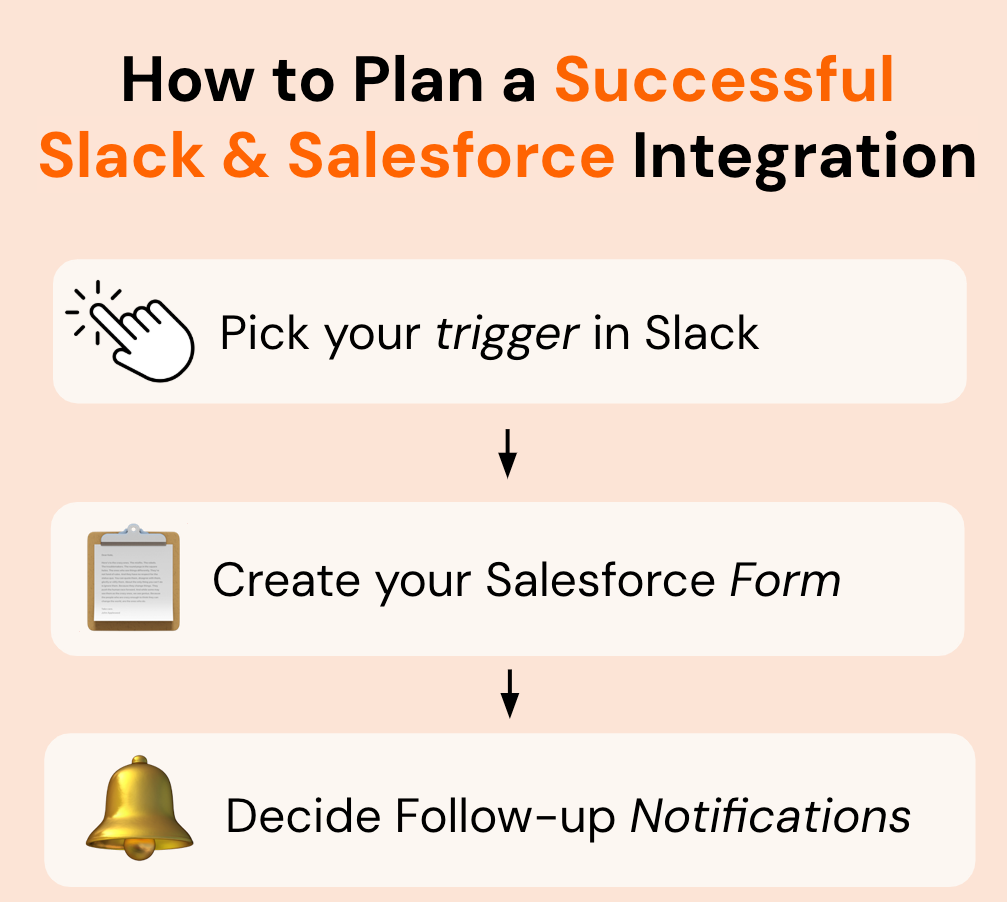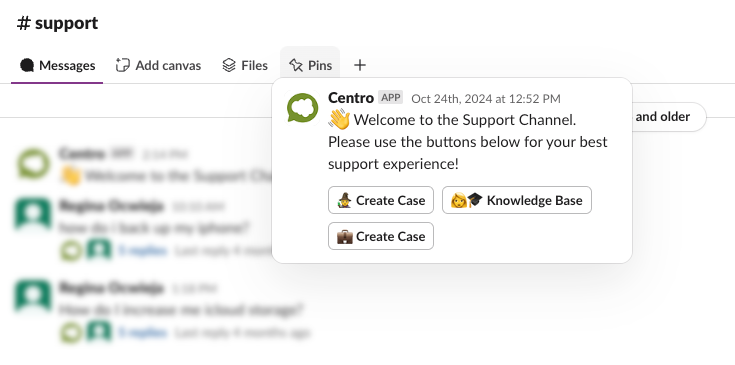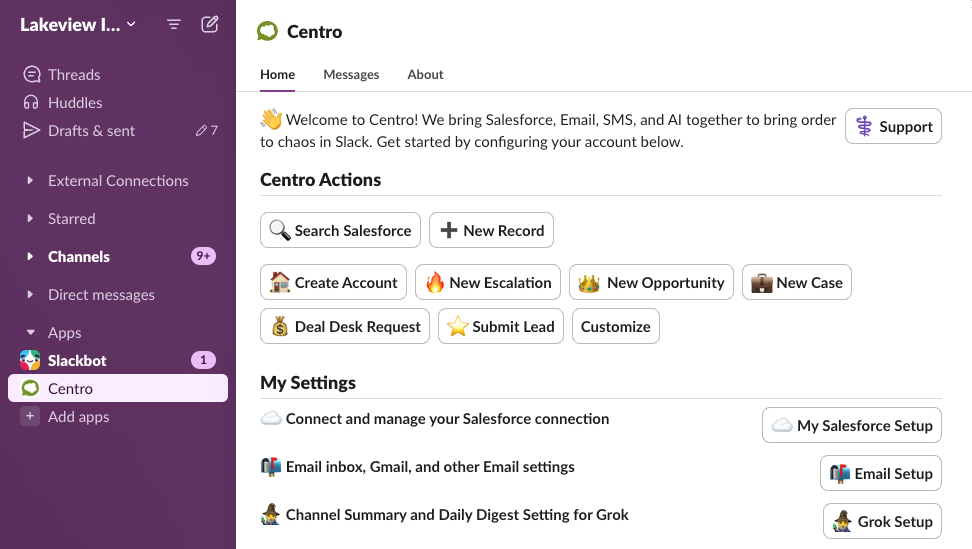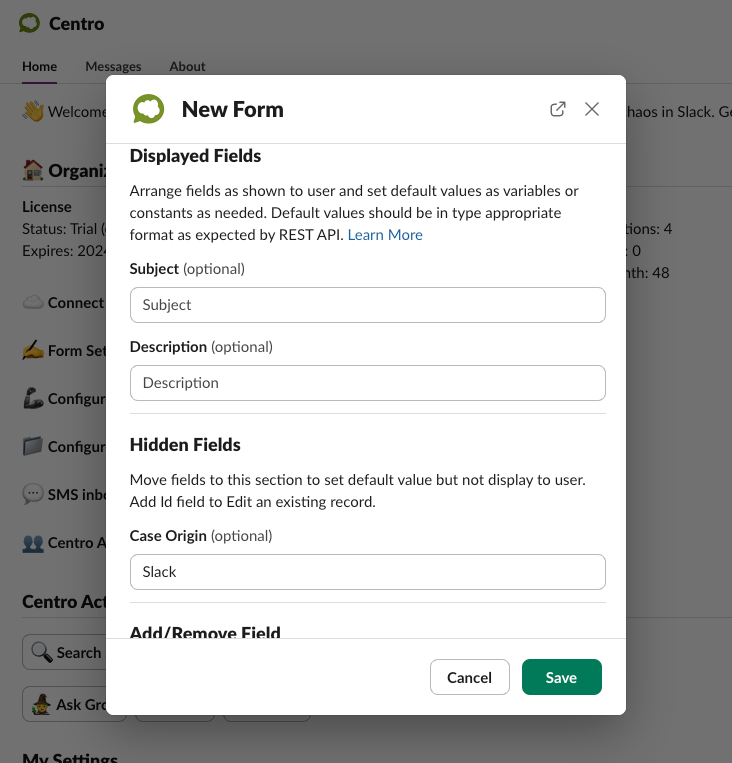Planning a Successful Salesforce and Slack Integration with Centro

Salesforce and Slack have become indispensable tools for many organizations, whether you’re managing internal processes or engaging with external customers. These two platforms can dramatically improve communication, accelerate deal cycles, and enhance support when combined effectively. That’s where Centro comes in. Centro offers a highly flexible way to integrate Salesforce and Slack, creating custom triggers, forms, and follow-up processes—all without requiring users to have Salesforce licenses. Even better, Centro can be white-labeled to match your company’s branding.
This post will outline three key considerations to help you plan a successful Salesforce-Slack integration using Centro. We’ll also explore three practical use cases—IT Help Desk, Customer Support, and a third scenario—so you can see the power of this integration in action.
1. Choose Your Triggering Mechanism
The first step is deciding how you want Centro to initiate a form fill or data capture process within Slack. Centro provides multiple trigger options:
1. Button Pinned in a Channel

Pin a button to a specific channel (e.g., #it-help or #customer-support) that, when clicked, launches a form. This is ideal for high-traffic channels where users frequently seek help. See our set-up video for details instructions on how to get this quickly setup in your organization.
2. Custom Button in the Centro App

Within Slack’s sidebar, users can open the Centro App and see a custom buttons. This method can be easier to train users to simply go to Centro to initiate their workflows. The buttons can be configured to use a user's Salesforce login, or work without a Salesforce license. See our set-up video to set this method up!
3. Emoji on a Message
A simple emoji reaction—like a checkmark or a question mark—can automatically trigger Centro to open a form related to that specific message. This approach is excellent if you want to quickly escalate a conversation to a formal request. Best of all - the emoji can work in any channel where the Centro App is present! See our quick-start guide to get this up and running.
4. Typing a Message in a Channel
Perhaps the most straightforward approach for end-users is simply typing a message in a designated channel. This trigger can funnel them into your Salesforce-based workflow immediately.
Choosing the right trigger depends on your existing Slack culture. If people are already comfortable with slash commands, then go that route. If a large portion of your team prefers clickable visual elements, a pinned button might be more user-friendly.
Bonus: Combine with Centro AI and you'll have a very pragmatic and simply way to deflect questions or answer your team's common questions using AI!
See our set-up guide for how to get this up and running quickly in your workspace.
2. Create Your Custom Salesforce Form
Once you’ve settled on a trigger, the next step is building a form that collects all the data you want to store in Salesforce. Here’s what makes Centro’s forms stand out:
1. No Salesforce License Required
Centro forms do not require end-users to hold a Salesforce license. This is especially beneficial when working with external partners or cross-functional teams who don’t typically need access to Salesforce.
2. Field Mapping
Easily map each field to a corresponding Salesforce field. For instance, the form's “Case Description” field can automatically populate a “Description” field on a Salesforce Case object.
3. Hidden Fields and Pre-Filled Values
Sometimes, you may want to send metadata like the channel name or user role into Salesforce without the user needing to fill it out. Centro allows you to hide these fields from the form while still passing the data behind the scenes.
4. White Labeling
If you want a branded experience, you can white-label Centro to reflect your company’s colors, logo, and messaging. This ensures a consistent brand identity even when your users are interacting with an external platform.
Try to keep your form concise but thorough. The fewer clicks and data entries required, the better your completion rates will be. Remember that you can continually refine your forms and create multiple versions for different use cases.

3. Determine Your Follow-Up Process
What happens next after a form is submitted? This is where Centro’s Salesforce Flow elements shine. You can set up simple or sophisticated follow-up steps depending on your use case:
1. Immediate Direct Message (DM)
As soon as a form is completed, Centro can automatically send a Slack DM to the user confirming receipt. This is perfect for scenarios where immediate acknowledgment is crucial.
2. Ephemeral Channel Message
An ephemeral message in the Slack channel can let everyone know—without lingering in the channel history—that the request was received and is being processed.
3. Internal Notifications
You can define which team members or channels need to be notified. Your IT manager may want to be alerted for hardware requests, while your Customer Success team needs a heads-up when new lead forms are submitted.
4. Scheduled Follow-Ups
Centro's Flow elements can automate these tasks if you want to ping the requester every 24 hours for additional information or schedule a manager review once a week. You get extreme flexibility in how and when you follow up.
Deciding on a follow-up process involves asking key questions: who needs to know, how quickly they need to respond, and whether the user needs regular status updates.
Three Use Cases in Action
Use Case 1: IT Help Desk (Internal)
Imagine you’re running an internal IT Help Desk. By pinning a Centro button to your #it-help channel, employees can quickly launch a form for hardware requests, password resets, or software issues. The submitted form automatically creates a Case in Salesforce, and a DM is sent back to the employee to confirm the request. Meanwhile, your IT manager receives a direct notification in Slack to triage urgent issues immediately. See video below of an example of this:
Use Case 2: Customer Support (External Slack Connect Channel)
Centro can streamline the support process for businesses that support customers via Slack Connect. Customers can type a command like /support-request in the shared channel when they have an issue. Centro opens a form that captures the details, creating a Salesforce Case in real-time. The support team is notified, and the customer receives an ephemeral message to confirm the submission. This sets a professional tone and ensures consistent, trackable handling of external requests. See video below:
Use Case 3: Event Registration (Internal or External)
If you host webinars, conferences, or community events, you can leverage Centro for registration and lead generation. Pin a button in your #events channel or provide a custom Centro App button that launches a registration form. All attendee details map directly into Salesforce (e.g., creating a new Contact or adding a Campaign Member). You can schedule automated follow-ups or reminders to ensure participants don’t miss crucial details leading up to the event.
Final Thoughts
Planning out your Salesforce and Slack integration can feel daunting, but with Centro’s flexible triggers, custom forms, and robust follow-up processes, you can design workflows that enhance collaboration. Whether you’re handling internal IT tickets, external customer support, or any other scenario, Centro empowers your teams to collect and track the data they need—without requiring Salesforce licenses.
And remember, you can white-label Centro to maintain a seamless brand experience. Your entire workflow—from Slack to Salesforce—feels like a cohesive platform that drives productivity and engagement.
Ready to get started? Begin by selecting your trigger mechanism, designing a form that captures all the crucial data, and planning a follow-up strategy that keeps everyone informed and on track. With those pieces in place, you’re on your way to a game-changing Salesforce-Slack integration with Centro.
Get started with Centro by booking a call today!


